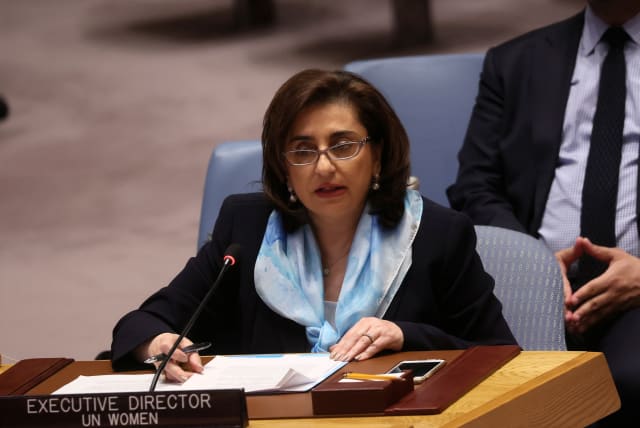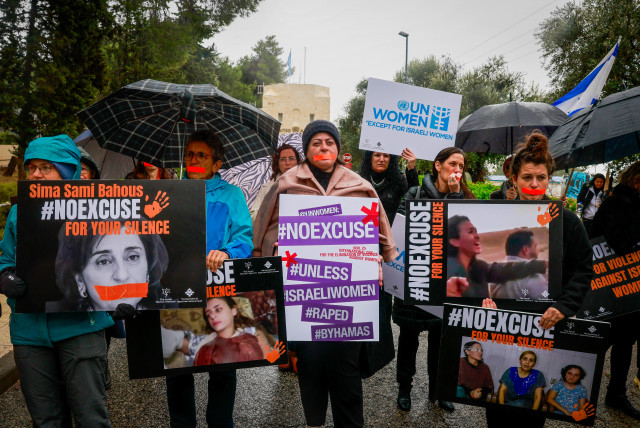UN Women’s late statement on sexual violence by Hamas - not enough

Evidence of Hamas’ sexual violence on October 7 was available all along. Women activists hope that its presentation at the UN headquarters will lead more people to recognize what happened.
Following the atrocities committed against women by Hamas on October 7, the world’s women’s organizations stayed silent. UN Women stayed silent too and only eight weeks after the events, it issued what many called a “generic” statement recognizing gender-based violence and sexual assault perpetrated on Israeli women by the terrorists that crossed into Israel that black sabbath.
“We unequivocally condemn the brutal attacks by Hamas on Israel on 7 October. We are alarmed by the numerous accounts of gender-based atrocities and sexual violence during those attacks,” read the statement.
However, the women in Israel leading the campaign for raising awareness about such crimes committed by Hamas believe that this statement alone is not enough. Marketing strategy expert Nataly Livski was one of the founders of the global campaign #Me_Too_Unless_Ur_A_Jew, which called out the UN Women organization for its lack of condemnation of Hamas’s violence against women. She told The Media Line that recognizing and condemning the atrocities against women done by Hamas should only be the first step.
“Condemnation after two months, we don’t need this, we don’t need them to say this happened, because we know this happened. I hope it will give birth to new things that will make sure this will not happen again,” Livski said noting that an example could be a committee to escort UN Women in the next couple of years to make sure that such mistreatment of a group of women does not occur again.
“We need answers. They should acknowledge this. But the next step should be to be proactive about this,” she continued.
In an event on Monday at the United Nations headquarters in New York, some 800 people were presented with evidence of large-scale sexual violence perpetrated by Hamas during its attack on Israel on October 7.
Those same testimonials, added Livski, were available to the general public almost two months ago. From the very beginning, there were a lot of open sources where people could look and listen to it. But she added that after this, “People cannot ignore it anymore, because it started with a very silent voice, a low voice, but now when it got to be so public, and I’m guessing that more people would have to recognize this,” she said.
First responders reflect
The Media Line spoke to Chaim Otmazgin, commander of ZAKA Specialty Units. He participated as a first responder at several sites of the massacre including the Nova Festival and most of the kibbutzim in the Gaza Envelope.
“It looked like in the checklist of the terrorists who embarked on the attack was to murder, and if it could have been done by mutilating organs, or burning or profaning the bodies, even better. Especially in women,” he said.
Otmazgin spoke about three different scenes he encountered at the sites.
On Sunday morning, when he was on the road heading to the kibbutzim, some civilians stopped his car and took him to a grove to see the bodies of three people who were murdered there. A man and two women.
“The man had only a gunshot in his head,” he said. “One of the women had all her upper body totally naked, the clothing was torn. She was shot both in her head and between her legs. Her friend who was beside her, was also shot in the head. But her shorts were pinned towards her crotch and there were signs of violence and bruises in her leg in the area of the crotch,” Otmazgin recalled.
In one of the kibbutzim, he continued, “I entered a house. In it were three women. I saw two women shot in the bomb shelter and a younger woman in the next room in the bed, her pants rolled down and she had also a gunshot in her head.”
Lastly, Otmazgin recounted how he entered an almost-destroyed house in another of the kibbutzim, and under some rubble, “We saw a woman’s body naked, with a sharp object stuck in her crotch,” he noted.
On Monday, State Department spokesman Matthew Miller also addressed the subject while speaking about the women who are still held captive by Hamas.
“It seems one of the reasons they don’t want to turn women over that they have been holding hostage and the reason this pause fell apart is that they don’t want those women to be able to talk about what happened to them during their time in custody,” he said on a statement.
During the event at the UN headquarters in New York, disturbing testimonies were presented. Women who either survived the massacre or were part of the first responders were shown in video with their faces blurred, describing what they witnessed.
A survivor of the Nova Music Festival was seen describing a situation where a woman was being brutally raped. “They laid a woman down, and I understand that he is raping her. He was basically shifting her position. And then they pass her on to another person. She was alive. She stood on her feet. She was bleeding from her back. ... He was pulling her hair, she had long hair. ... She was undressed, and he cuts her breasts, he throws them on the road, they are playing with it.”
Another woman who dealt with the bodies that were recovered from the festival area said during the police investigation: “Their hands were behind their backs. there was a body of a woman that had a blood stain in her genitalia.”
“There were a lot of gun wounds there. Shooting was targeted at sexual organs. We saw that a lot,” said a first responder.
As this evidence had been available for several weeks already and UN Women and other international organizations stayed silent for so long, Israel’s first lady Michal Herzog denounced them.
“The silence of international human rights organizations, and the unwillingness to believe Israeli women in the face of overwhelming evidence has been devastating,” she said.
The Hamas attacks “deeply impacted our visceral understanding of the cruelty of gender-based sexual violence—and our faith in the international organizations that claim to care about women,” Herzog continued.
Jerusalem Post Store
`; document.getElementById("linkPremium").innerHTML = cont; var divWithLink = document.getElementById("premium-link"); if (divWithLink !== null && divWithLink !== 'undefined') { divWithLink.style.border = "solid 1px #cb0f3e"; divWithLink.style.textAlign = "center"; divWithLink.style.marginBottom = "15px"; divWithLink.style.marginTop = "15px"; divWithLink.style.width = "100%"; divWithLink.style.backgroundColor = "#122952"; divWithLink.style.color = "#ffffff"; divWithLink.style.lineHeight = "1.5"; } } (function (v, i) { });

